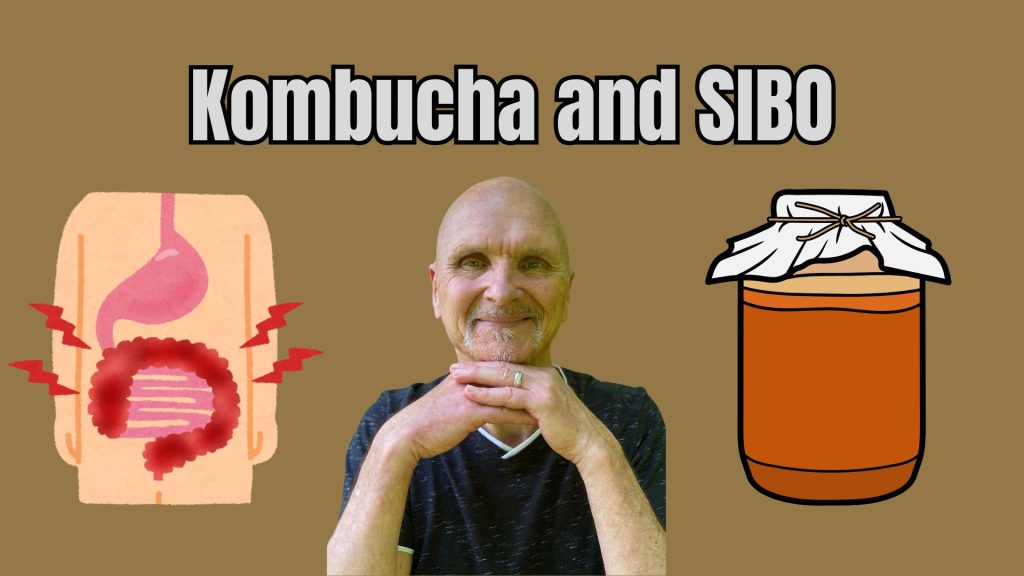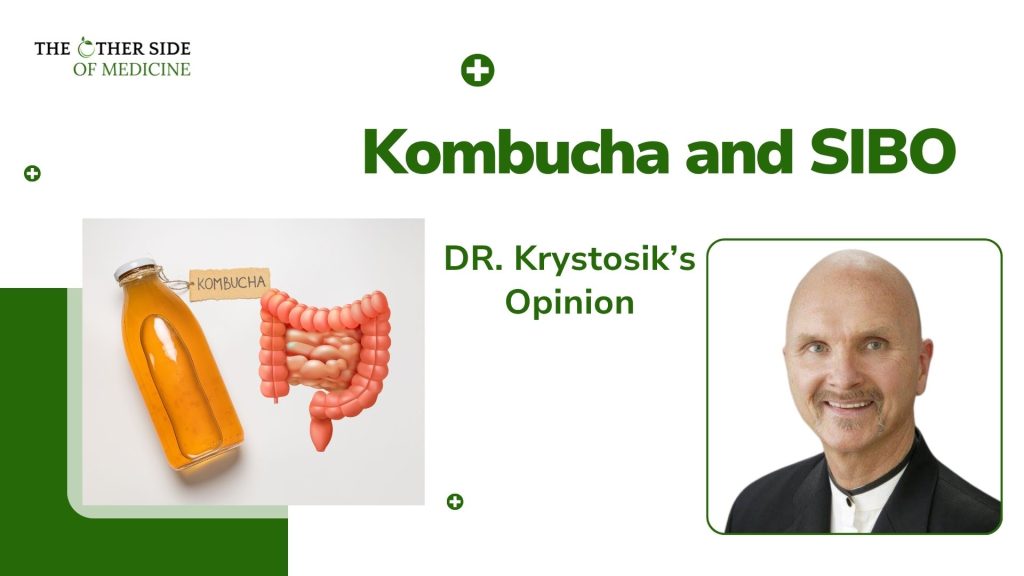If you’re struggling with bloating, cramping, or other gut health problems, there’s a good chance you’re fighting with a condition called SIBO—Small Intestinal Bacterial Overgrowth.
This often-overlooked gut health problem affects millions, and conventional medicine is still struggling to find long-term solutions that go beyond merely treating symptoms. But here’s the good news: an ancient beverage called kombucha may offer some surprising support for those dealing with SIBO.
Let’s explore how this fizzy, fermented tea could play a role in restoring balance to your gut microbiome—and what the research says about it.

What Is SIBO, and Why Should You Care?
SIBO occurs when bacteria that should be living in the large intestine begin to take up residence in the small intestine, where they don’t belong. This imbalance in gut bacteria disrupts digestion and nutrient absorption, and causes a long list of symptoms: gas, bloating, constipation or diarrhea, fatigue, skin issues, and even brain fog.
Mainstream medicine relies on antibiotics like Rifaximin, which only temporarily clears the overgrowth, but it fails to address the root cause. And here’s the worst problem: the recurrence rate of SIBO after antibiotics is up to 45% within a year (Rezaie et al., 2016).
That’s where kombucha shines.
Kombucha 101: What Makes It Unique?
Kombucha is a fermented tea made with green or black tea, sugar, and a SCOBY—a symbiotic culture of bacteria and yeast. During fermentation, the sugar is consumed by the SCOBY, producing a rich mix of organic acids, enzymes, probiotics, B vitamins, and antioxidant compounds.
The final product is a lightly effervescent, tangy beverage that’s been consumed for centuries in Asia and Eastern Europe for its supposed digestive and immune-boosting properties.
But How Can It Help Fight SIBO?
1. Antimicrobial Properties: Kombucha vs. Harmful Gut Microbes
Kombucha doesn’t just add good bacteria—it also fights bad ones. A 2012 study published in the Journal of Food Biochemistry demonstrated that kombucha provides broad-spectrum antimicrobial activity against a variety of harmful microbes, including E. coli, Shigella, and Salmonella—bacteria commonly implicated in gut dysbiosis (Bhattacharya et al., 2012).
Another study published in Food Microbiology demonstrated kombucha’s antimicrobial power, from the combined benefits of acetic acid, lactic acid, ethanol, and catechins—all of which are naturally produced during fermentation (Greenwalt et al., 2000).
These natural compounds help prevent or reduce overgrowth of harmful bacteria in the small intestine without wiping out your beneficial microbes, unlike most antibiotics, which act like a time bomb to all gut bacteria, good and bad.
2. Restoring Microbial Balance with Probiotics
One of the cornerstones of healing SIBO is restoring microbial diversity and balance, not just getting rid of the bad guys. That’s where kombucha’s probiotic benefits shine.
Kombucha contains strains of Lactobacillus, Gluconacetobacter, Acetobacter, and various yeasts—many of which are known to support gut health, reduce inflammation, and even compete with harmful bacteria for space and nutrients.
In a 2021 study published in Nutrients, researchers found that certain probiotic strains could prevent the recurrence of SIBO by healing the lining of the gut (leaky gut) and improving constipation. (Quigley et al., 2021). Kombucha’s exact bacterial makeup can vary by batch, which helps add diversity to the gut bacteria. Diversity of gut bacteria is a desirable outcome for the restoration and improvement of gut health.
The final outcome? A natural beverage with a broad spectrum of bacteria that can support a healthy gut environment and reduce the risk of relapse of SIBO.
3. Supports Digestive Motility—A Key SIBO Factor
SIBO often arises from delayed gastrointestinal motility, constipation. Food and bacteria that sit too long in the small intestine give the wrong bacteria a chance to overpopulate.
Organic acids in kombucha—particularly glucuronic acid and acetic acid—have been shown to support liver detoxification and digestive enzyme production (Jayabalan et al., 2014). By promoting better breakdown of food and supporting digestive enzymes, kombucha helps regulate bowel transit time—a crucial element in SIBO prevention.
This aligns with the philosophy of natural medicine, which teaches that improving the movement of food through the digestive tract is essential to avoid harmful bacterial overgrowth, which leads to bloating and gas.
Isn’t Kombucha a Fermented Sugar Bomb?
Great question. While kombucha begins with sugar, most of it is broken down during fermentation. Look for store-bought versions that contain between 2 to 6 grams of sugar per 8 oz, depending on how long the brew ferments. My favorite brand is Synergy, sweetened with fruit juice and a minimal amount of sugar.
For those with active SIBO, it’s important to be cautious with sugar, even in fermented form. But here’s the key: properly brewed kombucha, particularly low-sugar or home-fermented versions, contains minimal fermentable carbs and is beneficial, even during SIBO treatment phases.
Pro tip: Choose raw, unpasteurized kombucha. Look for brands with less than 5 grams of sugar per serving—or better yet, brew your own and let it ferment longer to further reduce sugar content.
Who Should Avoid Kombucha?
As beneficial as kombucha can be, it’s not for everyone, at least not right away. If you’re in the early, symptomatic stages of SIBO or have histamine intolerance, the natural byproducts of fermentation may worsen your symptoms.
In those cases, it’s wise to start small—try just a 1-2 oz sip and monitor how you feel. Once your gut begins to heal, many people find they tolerate fermented foods much better. And if you’re in doubt, work with a practitioner trained in functional medicine or nutritional therapy. I would be honored to provide you with my professional services. You can schedule an initial consultation appointment with me right now for a reduced fee of only $79, normally $125.
Final Thoughts: A Functional Tool in a Bigger Toolbox

Let’s be clear: Kombucha is not a cure for SIBO. But it can be a powerful aid in the healing process when used appropriately. Its antimicrobial properties, probiotic diversity benefits, and gut motility support make it an evidence-based, functional food worth considering.
Like I tell my patients: real healing comes from addressing the root cause, not just bombing the symptoms with antibiotics. Kombucha is part of a gut-rebuilding strategy that includes diet, lifestyle, and targeted supplementation. Kombucha offers a natural way to support your body’s self-healing power.
